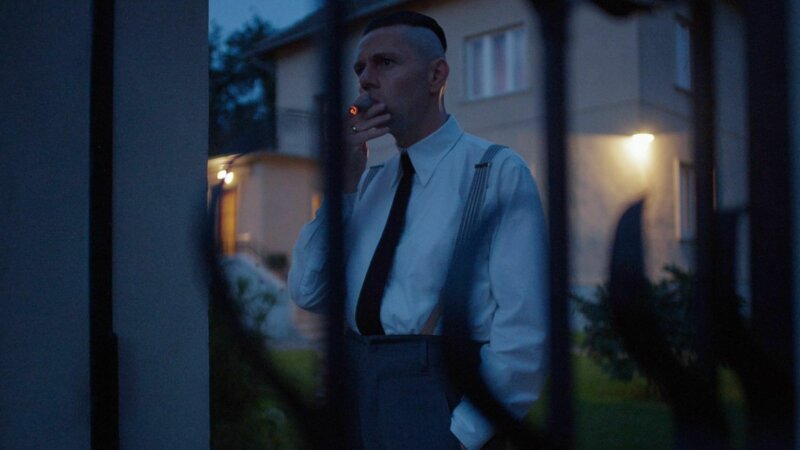David Lynch’s Dirty Dreams.
JOÃO PAULO SIMÕES.
Interpretations of David Lynch’s Lost Highway continue to proliferate like jackals forever digging into a carcass. Still, while death remains at the core of this nocturnal journey, few other films pulsate with such beautifully muted heartbeat. For all its ambiguity and supernatural overtones, no other piece of cinema quite manages to brush itself against the fabric of reality like this 1997 masterpiece.
In the same way that the film embraces cinematic conventions by crossing genres along the way, it also establishes a series of archetypes that, to some extent, aid our perception of the characters. But I would argue that to approach the film from a strictly Jungian or Freudian perspective is to deny its major strengths. While those elements are undeniably there, Lost Highway expresses something far more deep-seated – our primal discomfort in the face of the unknown.
Unashamedly masculine, the film employs the figure of the woman – amidst that most paradigmatic stage that is a marriage – as the ultimate source of anxiety, doubt and multi-layered depths. The husband’s failure to penetrate her mind is reflected in his impotence when attempting to possess her body, on which he reads an indelibly inscribed sexual history. All ambiguity, external or otherwise, flows from there and escalates to the point of the necessary separation from that reality. And then there’s what’s undoubtedly the most important, misconstrued and underrated aspect of it all – the filmmaking.
For all its ambiguity of tone and subjectivity of imagery, the first half of Lost Highway is perhaps the closest to reality you will ever get on screen. Lynch understands perfectly that cinema, when distilled to its essence, is ‘the fixing of time’. What we have in this film is something remarkable that goes beyond measured pace or rich atmosphere. The household we’re invited to inhabit is filled with time that is both psychologically internal and unrelentingly external. In other words, it’s the way we experience time in the real world.
The paradox rests upon the fact that cinemagoers expect a re-ordering of time, a sense of normality conveyed by the illusion of some sort of realism – hence the vast majority of reactions to the film being that of perplexity or repulsion.
The nightmarish narrative content may get in the way of grasping such notions, but I say: listen to silence that permeates ‘your own time’. It may very well be as amplified as Lynch’s.
capturafilmes.blogspot.co.uk streamingthemovie.blogspot.co.uk
|ALEXANDER MURRAY.
Welcome to Twin Peaks, Freudian flipside to America’s overreaching ambition. Look at its snow-capped breasts, and between them, the uncanny valley where nothing is quite as it seems. This is the archetypal sleepy town, caught between two states of being. To watch it is to fall into the collective subconscious where all its characters are trapped.
“It’s like I’m having the most beautiful dream and the most terrible nightmare all at once,” confesses Donna Hayward, best friend of prom queen Laura Palmer, whose murder rips open the town’s psyche and summons FBI Special Agent Cooper to investigate. Both logical and intuitive, Cooper straddles the conscious and subconscious realms. At night, he visits the Red Room, a dream-within-a-dream where everything is reversed like it’s glimpsed in a mirror.
Twin Peaks is America’s naked selfie. This is the country that institutionalised wish fulfillment and repatriated psychoanalysis to mop up the mess of getting exactly what you think you need. In Twin Peaks, the woozy tension between desire and reality hangs muskily in the air. It’s probably why they make such damn fine coffee.
Lynch fuses noir (sex and detectives) with gothic (fear of the familiar) and carnie culture (a giant and a dwarf) to create a campy pastiche that seduces as much as it reduces that seduction to a formula (lounge music and lipstick). Baudrillard once said that seduction cannot be represented, because by showing it, you’re doing it. It’s testament to Lynch’s seductive power that even feminists love this schlocky soap about rape fantasies.
Dreams and fantasies are the fly tips of the conscious mind, where we can twerk freely and wake up sane, safe and sanitised. But in Twin Peaks, night infects day, merging hallucinations with reality: a babe wrapped up like a bouquet; a woman talking to her pet log; dreamy girls dancing to jazz. Most terrifying of all, sex itself emerges as a demon called Bob in cut-off denim who lurks at the foot of your bed.
In Lynch’s dystopia, male desire penetrates the red womb-room of the nation’s subconscious. Ultimately, Agent Cooper discovers to his cost that the whole town killed Laura, just as America corrupts all innocence.
Twin Peaks is a kind of pillow purgatory, nestled between the bosoms of sex and death or good and evil. And as with all dreams, there’s no resolution – just a lingering tingle of horniness and horror.
)




